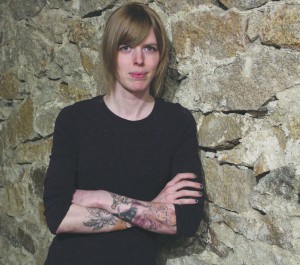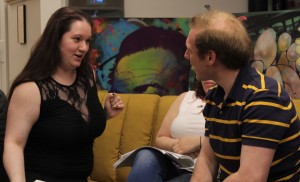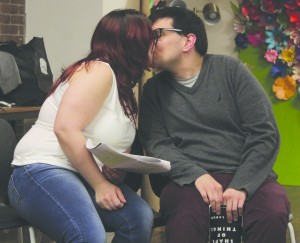I had the chance to talk with Korey Pimental and Taylor Corbett ahead of their opening of The Glass Horse Project’s The Shape of Things. Our conversation follows.
Marilyn Busch (Motif): Talk to me about your group — The Glass Horse Project. How did that come about and who else is in this group with you both?

Korey Pimental: Glass Horse started because I wanted to work as an actor. While I was majoring in English at UMASS Dartmouth, I found a mentor in the playwrighting professor, Mwalim, who saw my potential as an actor and theater artist. He took me under his wing and brought me into his organization, New African Company, to teach me how to produce because the conversations surrounding the inclusion of disabled talent were not as widely had as they are now. Even four, five years ago when I was in college and auditioning for a lot of stuff and not getting much of anything, it felt like the discussion was on the fringes. Now, some short years later, we’re eons ahead of where we were in that discussion and I get to be a part of it, which I’m humbled by and grateful for, and I also get to support those who are in it with me. Back then, Mwalim and I had many conversations about how I’d have to advocate for myself to be in the room by showing people what I can do because I was going to have to work twice as hard as the able-bodied actor next to me, especially if I wanted to break through the glass ceiling and be accepted into an MFA Acting program (still the goal). So that’s the why, or the history, if you will.
Glass Horse Project works under a social justice initiative in terms of how we interact with our audience; because we primarily produce for and out of New Bedford, Mass, we operate under a wholly pay-what-you-can model because (last I checked) almost a quarter of the city is at or below the poverty threshold and we try to be as accessible as possible. It’s similar to how we cast; the best person gets the role regardless. I never thought I’d be a producer, but I’m glad to have the skill set.
Taylor Corbett: Officially, I came on as a resident artist in November 2018, after Shel’s Shorts, and I just recently became the associate artistic director of Glass Horse. It is just Korey and I as far as artistic staff; but we do have a stage manager who I brought with me because they have worked with me before, named Sev Marshall, and a few people we consider resident actors. We also work closely with WatermellonAlligator Theatre Company, the theater company in residence over at Cotuit Center for the Arts black box. Jess [Wilson], the artistic director there, and Garrett [Olson], the associate artistic director have really helped us in a bunch of ways. We also collaborate a lot on different projects.
MB: And what about the group’s name? Is it a Glass Menagerie reference? The duality of fragility and strength?
KP: I didn’t even consider the duality between fragility and strength! I wish I could say that was it. That’s deep. But no, it is, in fact, a Menagerie reference. It was the first show that I ever produced, and I also played Tom. So, producing a show for the first time ever and taking on such a mammoth of a role was … a big learning curve. But I decided to pay homage to that experience.
MB: Korey, you mentioned that you are a disabled actor. Can you speak to that more specifically?
KP: I have cerebral palsy (CP) and was diagnosed at 18 months. So, I’ve never known anything other than thriving in the world as a disabled kid and now a disabled man in his 20s. I believe, wholeheartedly, that we, as humans, are way more complex than just one aspect of who we are. I am more than my disability; it’s only a part of me. I go through life not solely as a disabled person, but as Korey, and I forget about my gait until I either walk by a mirror and it’s like, “Oh yeah, that’s how my body works” or I feel someone’s eyes follow me as I pass by them. With all of that being said, I think it’s important for me, in my own life and artistry, to own every part of myself for exactly what it is (adjective included) and exist in that power because I can’t hide my gait or my CP. So, I live visibly and in the way that works for me. Like every actor, I take my entire personhood and put it on display. My specific display just happens to be outside of what most people “expect” of actors, but I hope my visibility is helping change that.
MB: Neil LaBute’s The Shape of Things is a dark, funny, but darrrrrk, twisty take on Pygmalion, with one character “making over” another into a “better” version of themselves. Do you feel that by actively putting your disability into the mix as part of the character it adds another layer to the piece?
KP: I think it would be foolish of me to say, at this point, it doesn’t add a new layer to the text; this role wasn’t written for an actor like me in mind as a valid choice for casting. So yes, it does add a new layer and we have had conversations at the table about how this layer may deepen the show. What’s interesting is that none of our conversations about disability inclusion have been specifically about Adam (Shape’s protagonist) because this has just been his lived experience. He is already a fully realized person who goes about his day-to-day life with a visible disability. It’s the other characters in the play who we talked about being affected by this layer. Which is the core of this movement: It’s not that a disabled actor can’t play this role, it’s that we’ve been regulated to the outskirts because of other people’s perceptions, presumptions or comfort levels. This specific production allows us to normalize disabled bodies on stage in nondescript roles (because we are still losing descript roles to able-bodied actors, which is a separate issue) and in that normalization lies the bigger reality that ability is just another thread of the human experience. Secondly, nothing is being changed to make a specific reference to the inclusion of disability because it doesn’t have to be. Ability is a spectrum and we are starting to collectively hold a new understanding that there is no single view or experience to what disability is, which is great because the old view is myopic and damaging. So, the story still functions the same whether or not the actor playing Adam, and the character of Adam, is disabled or not; he still gets made over to be a “better” version of himself. As an actor, artist and an activist, I want to see us get to the point where disabled actors can get work based on their talent and there’s no conversation about what their disability brings to the show. Their disability will be a present part of them and will be accepted as normal. However, to get to that point, we have to have conversations like this. We need to hear from not just me, but myriad disabled or differently-abled talent because no one’s experience with it is the same. These conversations are vital to moving forward and being more inclusive. I’m happy to have them and share my experience and perspective because it means we’re progressing.
MB: Taylor, as director of The Shape of Things, I have to ask you, “Why LaBute?” His work is pretty polarizing. What do you see as his strengths as a playwright?
TC: I think that theater in general, and theater that is really challenging, has the potential to push people to examine their own lives and their way of viewing the world – to achieve some level of catharsis and be affecting. Theater that surprises you and puts you in a position where you are questioning whether you have gone too far or allowed your autonomy to be lost should exist. It should push the boundaries of expectation. With that said, LaBute’s plays are layered with a thick sense of misogyny and toxic masculinity that is all too real in our world. As not only a woman, but a trans woman, I am very aware of the disparity in privilege in the patriarchal system. It is my job as a theater artist to fight against that in anyway I can. By acknowledging the inherent misogyny of the work and fighting against it, we strip away that thick layer to achieve the truth behind it.
MB: Are LaBute’s instructions that it is to be performed without an intermission or a curtain call still attached to the script?
TC: There will be no intermission and our curtain call, if you can call it that, is an invitation to the audience to join a talk back and decompress with the cast and production team. We hope to discuss the message and its relevance to 2019. Our world has changed so drastically since it was first published, and I feel it’s important to give the audience a space to start that work.
MB: Korey, recently there was a great post you made on Facebook about how when Ali Stroker* was doing Spelling Bee at Paper Mill you decided to reach out to her – and she responded (!!). Talk to me about that story and why it was meaningful to you…

Photo credit: Taylor K. Corbett
KP: When I was 18, I didn’t know how it would be possible for me to have a professional career in the arts. All I had was a real love for the performing arts, and that love and resolve was forced to strengthen with every negative experience I had navigating this space. I used to really want to do musical theater professionally because I grew up listening to cast recordings. Ali Stroker was the first person from my community who I ever saw working professionally and she was doing musical theater, so it was huge! So, I did what any 18-year-old starved of representation would do, I messaged her randomly on Facebook. I don’t remember what I said in great detail, but I made sure to tell her she inspired me, and how I now knew I could have a career because she showed me it’s possible, and I asked for advice. Sure enough, she responded. She told me the sky was the limit and a bunch of other lovely things that I’m forgetting specifically, but I remember her being so gracious and kind. It definitely helped strengthen my resolve moving forward at 18 (which I definitely needed). She and I haven’t interacted since that one message and I doubt she’d even remember getting a Facebook message from me. But the fact that she responded was huge for me. I carried her words with me. One day, I hope to share what that meant.
The Glass Horse Project presents The Shape of Things by Neil LaBute, directed by Taylor K. Corbett starring Geoffrey D. Besser, Monica Hartford, Kerri Lamoth and Korey J. Pimental. Performances are one weekend only, May 30 – June 1 at Co-Creative Center, 137 Union St, New Bedford, Mass. Admission is Free/Pay What you Can, but please email theglasshorseproject@gmail.com to reserve tickets.
*Ali Stroker is a Tony Award winner and the first actress who needs a wheelchair for mobility known to have appeared on a Broadway stage.